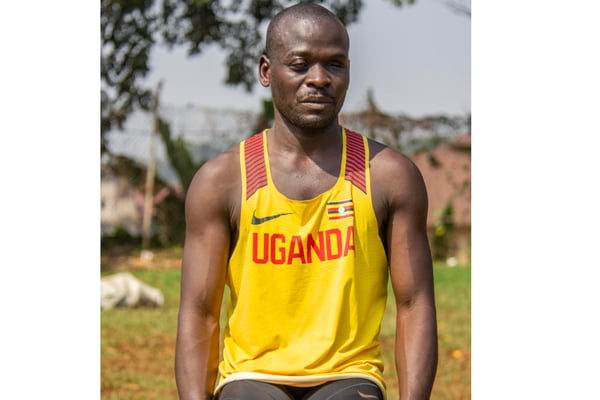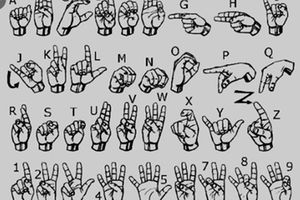
Sibomana supports visually impaired students.
In 2014, Papi Sibomana travelled to India, hoping to get treatment to repair his vision, which he had lost three years earlier. Arriving full of optimism, his hopes were dashed when he was told that his impairment was incurable. Instead of treatment, he was referred to a rehabilitation centre, where for the next three months, he was taught advanced skills in assistive technology (AT) and mobility.
“After three months in India, I came back to Rwanda. That’s when I started looking for what I can do in the community,” Sibomana said during an interview in Kigali.
He volunteered for Bright Future Cornerstone, a social enterprise that provides learning services. It would be the beginning of a busy but fruitful journey of discovery, learning and helping others learn how technology can assist those with disabilities.
Today, Sibomana has a smart phone as his constant companion. But this isn’t just any phone. Utilising its built-in screen reader, it vocalises messages from various apps. This allows him to use it effectively despite his vision loss. It’s also helping him to help young, visually-impaired innovators.
Sibomana started losing his sight in 2011 at the age of 22. This happened just before he began his undergraduate studies at Rwanda’s School of Finance and Banking (now, University of Rwanda-College of Business and Economics). Battling with his sight and hoping it would improve, he enrolled anyway but soon discovered a complete lack of support. Despite this, he pressed on.
“I reached every office on the campus seeking support, but no one told me there was an assistive technology that could help me. During exams, I used to sit with an invigilator guiding me on how to write in the booklet. It was very hard,” he said.
According to the World Health Organisation (WHO), access to assistive technology in Africa is severely limited, with less than 25 percent of those who need AT having access to it.
According to Sibomana, many young Africans are only introduced to the technology after graduation rather than at a younger age, which hinders their ability to fully utilise it.
A recent report, “Youth in Digital Africa: Our Connections. Our Choices. Our Future,” by research and advisory firm Caribou Digital in partnership with the Mastercard Foundation, points out that without early access to AT, African youth with disabilities risk being left behind in a world where the use of technology like the internet is associated with higher well-being,
The report, which Sibomana contributed to, also revealed that young African women are falling behind when it comes to utilising digital technologies. Sibomana noted that African women, especially those with visual impairments, often lack confidence in using digital technologies. He called for heightened awareness and integration of AT in primary education for early exposure.
In spite of his own lack of access to AT in college, Sibomana managed to graduate. But his struggles were far from over. He found few job prospects or internships available to him. Seeking opportunity, he turned to Masaka Rehabilitation Center for the Blind in Kigali, where he mastered Braille and mobility skills.
However, Braille’s limitations for everyday communication soon became obvious. While visiting a resource room at the former Kigali Institute of Education (now University of Rwanda-College of Education), he discovered JAWS, a screen-reading software tool.
Despite finding someone willing to teach him, the cost of the lessons (US$2-3 per hour) however, was difficult to afford.
“It wasn’t really easy, but I managed to master JAWS. After that, I bought my first laptop and started practising independently,” he said.
Supporting local community to promote digital inclusion
In 2015, after his return from the disappointing trip to India, Sibomana started mentoring visually impaired high school students, providing business training. He also joined Uwezo Youth Empowerment, which links graduates with disabilities to internship opportunities and interned at the Yego Centre in Kigali, where he received training in entrepreneurship and ICT. Later, he joined Digital Opportunity Trust (DOT) Rwanda as a startup facilitator and business coach, focusing on youth with disabilities.
Anaise Byukusenge, a Master’s student in Translation and Interpretation at the University of Rwanda, who has become a disability rights activist, remembers that Sibomana introduced her to assistive devices that have since allowed her to work as a freelance translator.
“Growing up as the youngest in an overprotective environment, I often relied on others. Papi taught me to embrace independence both professionally and personally. He strengthened my ability to accomplish work on my own and use assistive devices like phones and computers,” Byukusenge explained.
In 2016, Sibomana applied for and attended the Young African Leadership Initiative (YALI) in Kenya, graduating in early 2017. Inspired to help his community, he founded the Urumuri Association to connect visually impaired youth with the Rwanda Union of the Blind.
While attending Youth Connect in 2019, he met Tony Elumelu, founder of the Tony Elumelu Foundation, and submitted a business idea for poultry farming. Selected as a beneficiary, he received US$5,000 in seed capital in 2020. That was enough to start him on his project.
Recognising entrepreneurship as a path to employment for individuals with disabilities, Sibomana also applied for and received a Chevening Scholarship to pursue a Master’s Degree in Innovation Management and Entrepreneurship at the University of Portsmouth in the UK.
He began his studies in October 2020. During this time, he mentored others in assistive technologies like smartphones with screen readers and Braille displays, among others.
After graduating in 2021, Sibomana became an assistant lecturer in entrepreneurship at Rwanda Polytechnic, IPRC Musanze. He has since co-founded a consultancy firm that supports institutions in employing persons with disabilities by providing AT solutions.
His expertise also led him to join the Private Sector Federation (PSF) of Rwanda, which established a specialised cluster for persons with disabilities.
Pacifique Ndungutse, from Rwamagana District in the East of Rwanda, is another youth with disability who was supported by Sibomana. According to Ndungutse, Sibomana provided him with computer training and helped him successfully apply for the YALI 2022 cohort.
Ndungutse attended the programme in October 2022 and gained leadership skills he now uses to support others at his school and community.
“He continues to inspire us with his problem-solving approach,” said Ndungutse. “Papi always encourages those around him to be confident, self-reliant and to advocate for disability rights.”
**Gaps remain in AT access for African youth with disabilities**
Amani Niyoyita, an innovator known for developing smart white canes for the visually impaired and who is CEO and Founder at Polystar Nanotech, acknowledged that while advancements have been made, challenges persist, especially in making AT available in local languages such as Kinyarwanda.
“Digital inclusion means vulnerable people can access modern technology through our innovations. We must include all languages to help even those who didn’t attend school,” he said.
Niyoyita further highlighted the need for affordable solutions, suggesting integrated systems for all types of mobile phones to enhance accessibility.
“We must develop affordable solutions, remembering they often cannot afford many things,” he said.
Currently, Sibomana is volunteering with the Rwanda Union of the Blind, where he serves as chairperson of the advocacy committee. “And innovation is not just about ideas; it’s about empowering communities through accessible technology. I believe in the power of community and collaboration to drive inclusive innovation. Assistive technology isn’t just a tool; it’s a pathway to independence and equal opportunity.”
Milestones
In 2015, after his return from the disappointing trip to India, Sibomana started mentoring visually impaired high school students, providing business training. He also joined Uwezo Youth Empowerment, which links graduates with disabilities to internship opportunities and interned at the Yego Centre in Kigali, where he received training in ntrepreneurship and ICT. Later, he joined Digital Opportunity Trust (DOT) Rwanda as a startup facilitator and business coach, focusing on youth with disabilities.
After graduating in 2021, Sibomana became an assistant lecturer in ntrepreneurship at Rwanda Polytechnic, IPRC Musanze. He has since co-founded a consultancy firm that supports institutions in employing persons with disabilities by providing AT solutions.
He has also joined the Private Sector Federation (PSF) of Rwanda, which established a specialised cluster for persons with disabilities.








